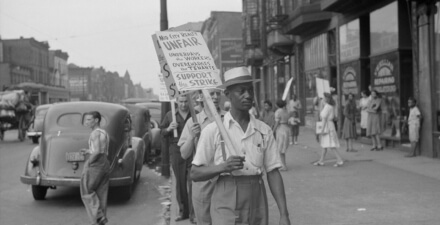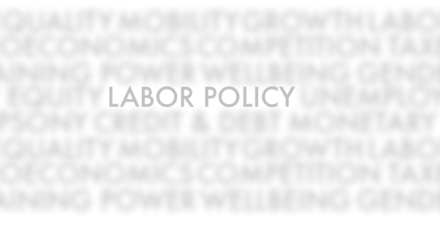Increasing evidence demonstrates the ways in which bargaining power shapes economic outcomes. One’s economic success is not merely defined by individual characteristics such as education. Equitable Growth’s work on unions and collective action in the United States examines the ways in which institutions intersect with economic trends and individual characteristics to ensure that workers can share in the gains of the economic growth to which they contribute.
Featured work
Will labor’s surging popularity result in new union members in the United States?
August 29, 2024
August 29, 2024
Unions in the United States improve worker safety and lower health inequality
December 13, 2022
December 13, 2022
Factsheet: How strong unions can restore workers’ bargaining power
May 1, 2020
May 1, 2020
Unions and the enforcement of labor rights: How organized labor protects U.S. workers against unfair and illegal employment practices
April 29, 2022
April 29, 2022
Aligning U.S. labor law with worker preferences for labor representation
February 18, 2020
February 18, 2020
Explore Content in Bargaining Power390
Latino workers are often segregated into bad jobs, but a strong U.S. labor movement can boost job quality and U.S. economic growth
October 13, 2022
October 13, 2022
Equitable Growth’s Jobs Day Graphs: September 2022 Report Edition
October 7, 2022
October 7, 2022
How corporate governance strategies hurt worker power in the United States
September 6, 2022
September 6, 2022
Equitable Growth’s Jobs Day Graphs: August 2022 Report Edition
September 2, 2022
September 2, 2022
Ahead of September’s jobs report, here is what the past 3 months of labor market data reveal about the health of the U.S. labor market
August 31, 2022
August 31, 2022
Do Labor Strikes Achieve Worker Demands? Understanding Strike Outcomes and Effectiveness
August 29, 2022
August 29, 2022
Labor Unions and Workplace Safety Before and During the COVID-19 Pandemic
August 29, 2022
August 29, 2022
Explore the Equitable Growth network of experts around the country and get answers to today's most pressing questions!












